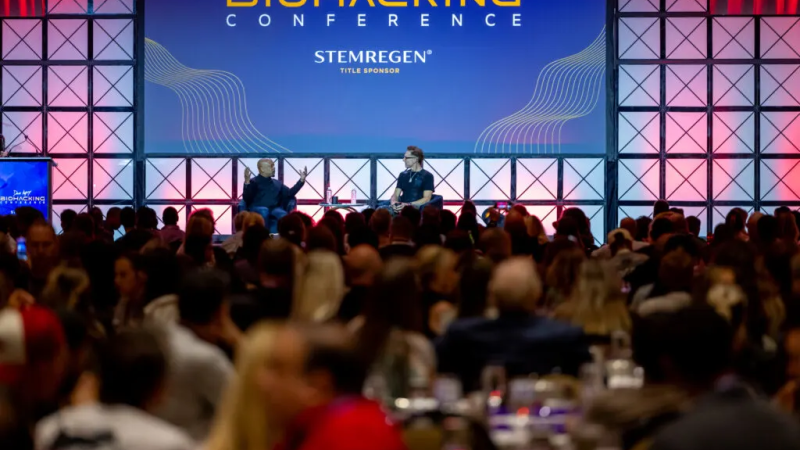
Exploring the Contributions of David Sinclair to Longevity Science
“Birthday candles don’t tell you how well you’ve been living and they certainly don’t tell you how many years you’ve got left.” Dr. David Sinclair
David Sinclair is a prominent figure in the field of longevity science, renowned for his groundbreaking research and innovative theories on aging and lifespan. This article aims to delve into the various aspects of Sinclair’s contributions to the field, from his early life and education to his influential work on sirtuins, resveratrol, and epigenetics. Furthermore, it will explore the controversies surrounding his research and the enduring impact he has made on longevity science and beyond.
Understanding David Sinclair: A Brief Biography
Before diving into Sinclair’s scientific journey, gaining insight into his early life and education is imperative, which laid the foundation for his illustrious career. Born and raised in New South Wales (Australia), Sinclair exhibited a remarkable curiosity and passion for biology from a young age. This led him to pursue higher education, obtaining a Ph.D. in genetics from the University of New South Wales. It was during this time that Sinclair’s fascination with the intricacies of aging sparked, setting the stage for his future endeavors.
After completing his studies, Sinclair completed a postdoctoral fellowship at the Massachusetts Institute of Technology (MIT) in the United States. He embarked on a career path that would shape the course of longevity science. He joined the prestigious teaching staff at Harvard Medical School, where he honed his research skills and cultivated an unwavering dedication to uncovering the mysteries of aging.
Early Life and Education
David Sinclair’s intellectual curiosity and drive for scientific discovery can be traced back to his early years. Growing up, Sinclair’s inquisitive nature was evident from his childhood, as he constantly sought answers to questions about the natural world. This burning curiosity propelled him towards a path of scientific exploration.
During his formative years, Sinclair’s parents encouraged his curiosity and provided him with ample resources to nurture his scientific interests. They often took him on nature walks, where he would observe and document various plant and animal species. These experiences not only deepened his love for biology but also instilled in him a sense of wonder and appreciation for the complexity of life.
After completing high school, Sinclair went to college close to home. During this time, he was exposed to the foundational concepts of biology, which eventually sparked his interest in aging and longevity. This newfound passion catalyzed his future research endeavors, shaping the trajectory of his career.
While studying at the University of New South Wales, Sinclair actively participated in research projects and internships, further expanding his knowledge and honing his scientific skills. He collaborated with esteemed professors and fellow students, delving into various areas of biology and gaining hands-on experience in conducting experiments and analyzing data.
Career Path and Achievements
After completing his studies, David Sinclair began his professional journey in the field of longevity science. He joined a research team at MIT, where he gained valuable experience and expanded his knowledge base. Sinclair’s exceptional dedication and perseverance soon earned him recognition, leading to significant breakthroughs and accolades throughout his career. His resume includes a position as a tenured professor at Harvard Medical School1.
During his early career, Sinclair focused on understanding the role of sirtuins in aging, a class of proteins that regulate various cellular processes. His groundbreaking research shed light on the aging process’s intricate mechanisms and opened up new avenues for potential interventions.
Over the years, Sinclair’s work on aging and longevity garnered widespread attention and acclaim. His research focused on various areas, such as the impact of resveratrol on lifespan and the potential of calorie restriction in extending a healthy lifespan. These groundbreaking discoveries brought Sinclair to the forefront of longevity science, solidifying his status as a leading figure in the field.
Throughout his career, Sinclair has published numerous scientific papers and delivered captivating lectures at conferences and universities worldwide. His work has advanced the understanding of aging and inspired a new generation of scientists to delve into the fascinating realm of longevity science.
As a testament to his contributions, Sinclair has received numerous awards and honors, including the CSL Prize and the Nathon Shock Award for gerontological research. His dedication to unraveling the secrets of aging continues to drive him forward as he tirelessly works towards developing interventions that could potentially enhance human health and lifespan.

Sinclair’s Groundbreaking Research in Longevity Science
David Sinclair’s contributions to longevity science are characterized by his pioneering research in key areas of interest. This section will explore two of his most influential research endeavors – sirtuins’ role in aging and resveratrol’s impact on lifespan.
The Role of Sirtuins in Aging
Sirtuins, a class of proteins found in living organisms, have emerged as a central focus of Sinclair’s research. His work has elucidated the crucial role that sirtuins play in the aging process and their potential as targets for interventions to enhance longevity.
Sinclair’s groundbreaking studies have revealed that sirtuins act as “guardians” of the genome, influencing cellular health and survival. These proteins regulate various cellular processes, including DNA repair and gene expression, thus exerting a profound impact on the aging process.
Further research conducted by Sinclair and his team has shown that sirtuins are involved in the regulation of energy metabolism and stress response pathways. Modulating these pathways, sirtuins help to maintain cellular homeostasis and promote healthy aging.
Moreover, Sinclair’s research has demonstrated that sirtuins play a crucial role in the regulation of inflammation and immune function. By modulating the activity of immune cells and inflammatory mediators, sirtuins contribute to the prevention of age-related chronic diseases.
Additionally, Sinclair’s studies have explored the interplay between sirtuins and other longevity-related factors, such as telomeres and mitochondrial function. These investigations have provided valuable insights into the complex mechanisms underlying aging and have paved the way for the development of novel therapeutic strategies.
The Impact of Resveratrol on Lifespan
Another significant aspect of Sinclair’s research pertains to the impact of resveratrol on lifespan. Resveratrol, a naturally occurring compound found in certain plants, gained attention due to its potential health benefits, particularly in promoting longevity.
Sinclair’s studies demonstrated that resveratrol activates sirtuins, thereby mimicking the effects of caloric restriction, a known method of extending lifespan in various organisms. This finding opened up new avenues for potential interventions to delay age-related diseases and enhance human lifespan.
Further investigations conducted by Sinclair and his team have explored the mechanisms through which resveratrol exerts its beneficial effects. They have found that resveratrol activates a variety of cellular pathways involved in stress response, DNA repair, and mitochondrial function, all of which contribute to improved healthspan and lifespan.
In addition, Sinclair’s research has shown that resveratrol has anti-inflammatory and antioxidant properties, which help to mitigate age-related damage and promote overall well-being. These findings have sparked interest in the potential use of resveratrol as a therapeutic agent for age-related diseases.
Furthermore, Sinclair’s studies have examined the effects of resveratrol on various model organisms, including yeast, worms, flies, and mice. These experiments have provided valuable insights into the conserved nature of the longevity-promoting effects of resveratrol across different species.
Overall, Sinclair’s groundbreaking research on the role of sirtuins in aging and the impact of resveratrol on lifespan has significantly advanced our understanding of the mechanisms underlying aging and opened up new possibilities for interventions to enhance longevity and promote healthy aging.
Sinclair’s Theories on Aging and Longevity
In addition to his pivotal research, David Sinclair has formulated innovative theories that provide valuable insights into the aging process and potential strategies for extending lifespan. This section will explore two prominent theories – the Information Theory of Aging and the Role of Epigenetics in Longevity.
The Information Theory of Aging
Sinclair’s Information Theory of Aging posits that age-related decline and the onset of diseases result from an accumulation of damaged information in our cells. According to this theory, genetic and epigenetic changes compromise cellular information’s accuracy and integrity, leading to functional decline.
This theory has important implications, as it suggests that by repairing or reversing damaged information, it may be possible to delay the aging process and mitigate age-related diseases. Sinclair’s research continues exploring strategies for harnessing this concept to improve health and lifespan.
The Role of Epigenetics in Longevity
Evidence gathered through Sinclair’s research has shed light on the critical role of epigenetics in determining lifespan. Epigenetic modifications, which control gene expression without altering the underlying DNA sequence, have been implicated in aging processes.
Sinclair’s insights into epigenetic regulation have demonstrated that these modifications play a pivotal role in determining the trajectory of aging and the onset of age-related diseases. Harnessing the power of epigenetic modifications holds promise for interventions to slow down the aging process and extend healthy lifespan.
Criticisms and Controversies Surrounding Sinclair’s Work
Despite the significant contributions that David Sinclair has made to the field of longevity science, his work has not been immune to criticism and controversies. This section will delve into the scientific community’s response to Sinclair’s theories and how he has addressed the controversies surrounding his research.
Scientific Community’s Response to Sinclair’s Theories
Sinclair’s groundbreaking research and bold theories have sparked extensive debates within the scientific community. While many researchers acknowledge the value of his contributions, others have raised questions and expressed skepticism regarding certain aspects of his work.
These criticisms range from methodological concerns to disagreements about the interpretation of data. However, it is essential to emphasize that healthy skepticism is a vital component of scientific progress, prompting researchers to refine their theories and deepen their understanding of complex phenomena.
Addressing the Controversies
David Sinclair has actively engaged with the scientific community and the public to address the controversies surrounding his research. He recognizes the importance of open dialogue and rigorous scientific scrutiny in advancing the understanding of longevity science.
Through publications2, conferences, and interviews, Sinclair has diligently responded to criticisms, providing additional evidence and addressing specific concerns raised by his peers. This commitment to transparency and scientific integrity underscores his dedication to furthering the field of longevity science.
Sinclair’s Influence on Longevity Science and Beyond
David Sinclair’s contributions extend beyond the realm of academic research, as his work has had a profound influence on both anti-aging research and public understanding of aging. This section will explore the impact he has made in these areas.
His Impact on Anti-Aging Research
Sinclair’s groundbreaking research and compelling theories have had a transformative effect on anti-aging research. By uncovering key mechanisms underlying the aging process, he has provided researchers with crucial insights and potential avenues for interventions.
His work has inspired numerous studies to develop therapeutic strategies to delay age-related diseases and extend human lifespan. Sinclair’s influence continues to shape the anti-aging research landscape, fostering innovation and driving progress.
Sinclair’s Contributions to Public Understanding of Aging
Beyond academia and scientific circles, David Sinclair has played a vital role in increasing public awareness and understanding of aging. Through his captivating writing and engaging public talks, he has successfully conveyed complex scientific concepts in a relatable manner.
Sinclair’s efforts have empowered individuals to take control of their health and make informed choices that may positively impact their aging process. By bridging the gap between scientific research and the general public, he has fostered a deeper appreciation for the science of aging.
Conclusion
In conclusion, David Sinclair’s contributions to longevity science are far-reaching and profound. From his formative years to his groundbreaking research and visionary theories, Sinclair has established himself as a leading figure in the field. Despite his work’s controversies, Sinclair remains committed to scientific rigor and transparency. His impact on anti-aging research and public understanding of aging is undeniably significant. As the pursuit of longevity science continues to evolve, Sinclair’s contributions will certainly continue to shape the future of our understanding of aging and lifespan. How fast are you aging? Find out by measuring your epigenetic age.
Lastly, if you’re interested in going deeper on health-related content, here are a few of our recent posts that you may want to read:
- Andrew Huberman is Wrong About NAD & Longevity
- 9 Powerful Benefits of Optimizing Your NAD
- What Does Peak Performance Look Like?
- Why Optimized, Precision Medicine is the Future
Referenced Sources:
Read More














